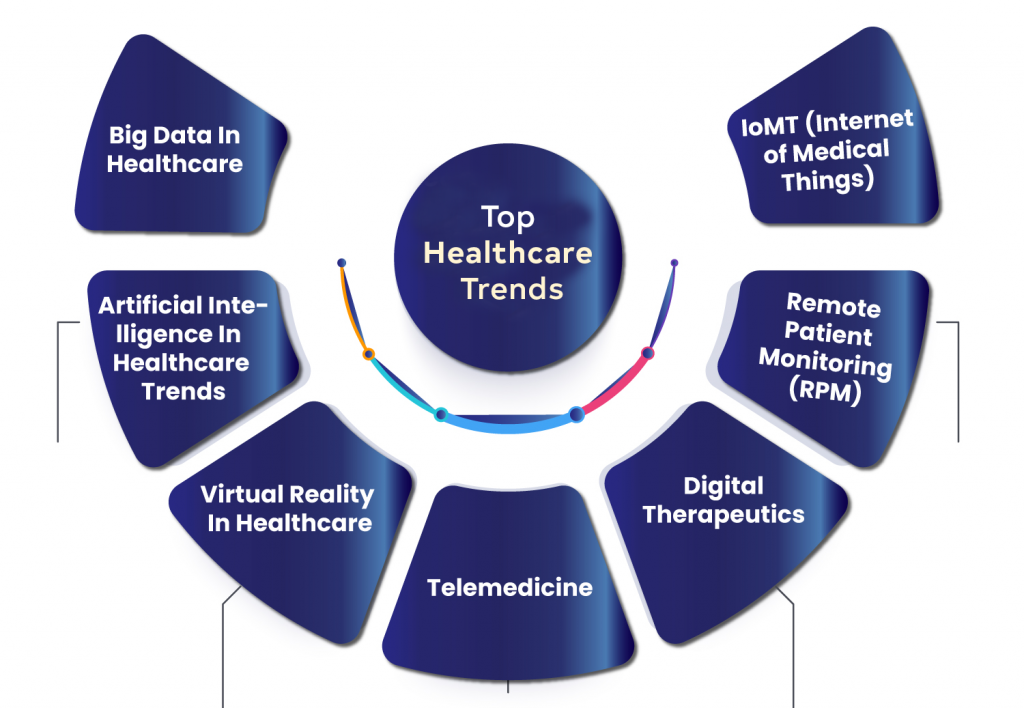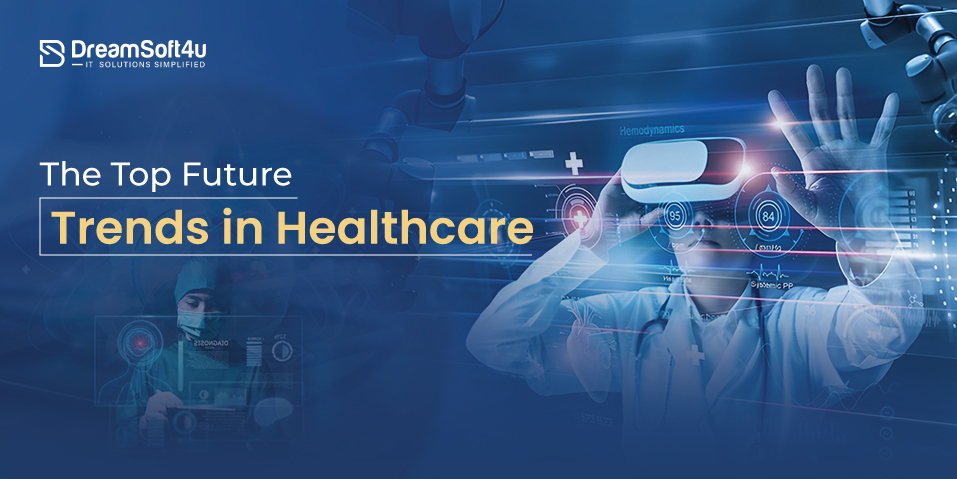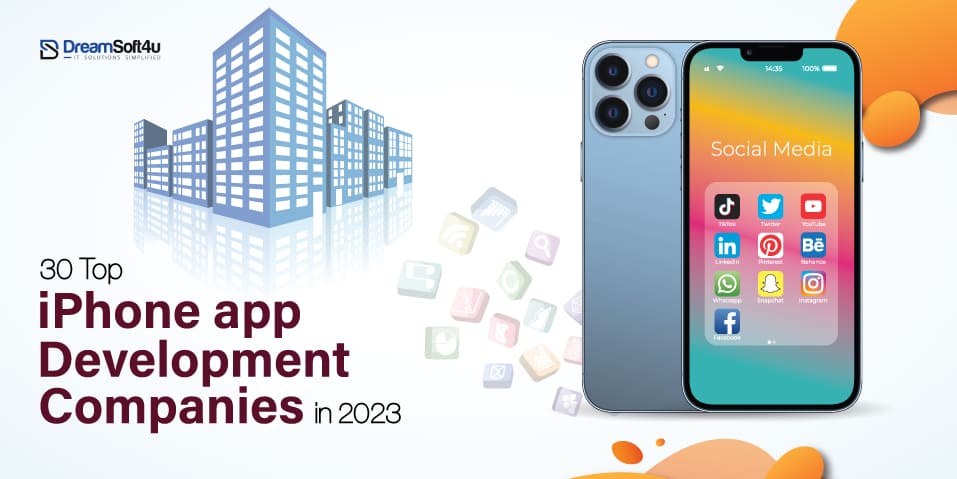Healthcare is evolving rapidly as the demand for technology is also increasing. Changes in technology improve not only the patient experience but also the doctors’ way of practice. With the growing technology, there’s a huge demand for Advanced AI diagnostic tools, leading to the expansion of telemedicine. As a result, technology is changing healthcare in exciting ways: it’s becoming more efficient, more personalized, and a lot more accessible by following Future Healthcare Trends.
In this blog, we’ll be looking at the top 11 future healthcare trends that will change the way we look at the industry. While we think of these as new gadgets or new technologies, we need to figure out how it works. It will give you a reflection of how healthcare is delivered and how patients interact with their care. Whether you are a patient or professional, we will cover all the aspects of the future of medicine. Moreover, these trends can enhance your interest in the future development of telemedicine from an investment perspective. So let’s look at what lies ahead in what will be the future of healthcare IT trends and what it will mean to all of us.
Table of Contents
ToggleWhat Are The Top 11 Healthcare Trends?
Here are the top 11 trends shaping the future as these trends in healthcare, making it more personalized, efficient, and accessible:

1. Big Data in Healthcare
The massive volume of information created by accepting the modernization, collecting the patient data, and managing the healthcare units is known as Big Data technology. It is being used with high variations, from treating patients to predicting and preventing an epidemic.
The expert reports from the global big data healthcare market state that the progress will reach $34.27 billion by 2024 at a CAGR of 22.07%. Furthermore, big data analysis will be worth around $68.03 billion by 2024. So, we can see big changes in digital healthcare trends the upcoming years.
2. IoMT (Internet of Medical Things)
It allows automation in the medical units, which boosts healthcare systems and services at a broad level. The technology allows hospitals, clinics, physicians, etc., to provide effective patient care to rural areas.
It is among the top healthcare trends that will bring innovation and integration for receiving timely and high-quality treatment at home. People get confused about IoMT and RPM solutions, but there is a significant difference between both of them.
3. Artificial Intelligence In Healthcare Trends
AI has built a significant difference between patient care before the 20s and now. Chatbots, humanoids, machine learning, etc., have made healthcare more progressive and automated than ever before. AI has systematized the clinical workflows, documentation, and automated, reliable reporting for patients. There are many significant benefits of introducing AI in healthcare:
- High-end reduction in clinical errors
- Track to patient’s medication adherence
- Quality diagnostic accuracy
- Improvised personal data security
- Reliable monitoring of patient’s healthcare data
- Sustainable quality of healthcare
- Automation in diagnostic reporting
- Low-cost operational expenses
4. Remote Patient Monitoring (RPM)
RPM will follow the Healthcare Technology Trends to meet the demands of users. It has come out as the top-notch solution for boosting healthcare in every corner of the world. Patient engagement, original reporting, fewer readmissions, and whatnot. Each of the functions is effectively implemented through remote patient monitoring.
The solution is an excellent healthcare tool in 2024 for cutting downtime and cost and will help deliver high-quality healthcare. All of the functionality will be done without face-to-face contact with the patient.
5. Virtual Reality In Healthcare
Virtual Reality (VR) is also being used for pain management, physical therapy, and mental health treatments, and it is a growing trend in healthcare. They provide immersive experiences that help recover patients as well as help to reduce a patient’s anxiety. For example, VR makes doctors’ medical training more realistic and effective, with realistic but risk-free environments in which to practice procedures. VR also makes it more interactive as technology continues to develop.
6. Digital Therapeutics
Digital Therapeutics is the essential element of digital health that involves technologies, products, and services utilized by healthcare and wellness industries. Digital Therapeutics term was coined in the year 2015 to conduct evidence-based treatments. It is used along with drugs and devices to improve patient care.
The term is abbreviated as DTx, a program for monitoring blood sugar levels, medication regimen, diet, and workout to offer the doctor a precise image of the patient’s health. The process can light an individual’s daily chaos and lifestyle, helping advance treatment.
7. Telemedicine
Telemedicine and its sub-branch telehealth are significant trends various governments have adopted in many nations. During COVID-19 and post-pandemic circumstances, it has proved to be a highly effective tool that has connected patients to future trends in healthcare and clinicians with others.
Furthermore, telemedicine app development company and investors helped several nations fight pandemics and other infectious diseases by bringing up revolutionary products. It has helped increase social distancing, effective patient care, fewer readmissions, and whatnot.
8. mHealth
Mobile health applications are intuitive and will be the next trendsetters in healthcare. It provides access to personalized information, patient statistics, etc., through wearable or connected devices. It is a fantastic way of coordinating with the top consultants in the world.
The solution is not restricted to boundaries and caste or creed. All you have to have is a smartphone with internet connectivity. Many physicians have increased their patient volumes by taking the help of the mHealth facilities.
9. Cloud Computing
Cloud computing is associated with the IT sector, but it has reached the healthcare industry at its full pace. It allows clinicians to deploy a compelling patient journey that supports tech-enabled care delivery through Telehealth RPM solutions and cloud services.
Furthermore, the tool gives healthcare providers vast storage space to keep the data safe and secure. The cloud storage features integrate many functionalities like network, security, billing, monitoring, and alerts.
10. Genomics
Healthcare experts are developing new tools to integrate genetic insights into clinical practice. These genomics tools are in high demand in healthcare as they are advancing at a rapid pace. Genomic testing can help doctors provide more personalized treatment based on a patient’s genetic makeup by following the Technology Trends. It means precision in diagnosis along with the formulation of better treatment plans. Additionally, users can have better communication so that care can be personalized to fit the unique health needs of each person.
11. Blockchain
The security and traceability of blockchain establish the technology compatibility for multiple applications in the healthcare industry. The core functionality includes electronic medical records, remote patient monitoring, pharmaceutical supply chain, and health insurance claims.
Moreover, the technology supports the management of EHRs and FHIRChain for transmitting clinical data. Blockchain technology is vital for establishing an intelligent contract, tracking drug counterfeiting, etc.
Planning to Build a Personalized Healthcare App for Your Business?
DreamSoft4u – A Leading Healthcare App Development Company.
Conclusion
We live in a futuristic timeline full of possibilities when it comes to the future of healthcare, enabled by new technologies and the new needs of our patients. However, those trends—AI to telemedicine—are likely to change the delivery and experience of care drastically. Therefore healthcare app development changes the way healthcare providers and patients should stay informed and be better prepared to adapt and take advantage of what is yet to come. That’s because innovations in health care are going to propel it further to a higher quality of care while also making it more accessible and personalized for everyone. Healthcare is bright and just beginning.
FAQs
Q1. What are the key trends shaping the future of healthcare?
The key trends include advancements in AI, telemedicine, personalized medicine, wearable technology, and data-driven healthcare, all of which are set to revolutionize care delivery.
Q2. How will AI impact healthcare in the future?
AI will improve diagnostics, streamline administrative tasks, and enable more accurate and faster decision-making, leading to better patient outcomes and more efficient healthcare systems.
Q3. Why is telemedicine considered a major future trend?
Telemedicine makes healthcare more accessible by allowing patients to consult with doctors remotely. It reduces the need for in-person visits and improves care for those in remote or underserved areas.
Q4. How will personalized medicine change patient care?
Personalized medicine tailors treatment plans to individual patients based on their genetic makeup, lifestyle, and medical history, offering more effective and targeted therapies.
Q5. What role will wearable technology play in future healthcare?
Wearable devices will enable continuous monitoring of health metrics, allowing patients and doctors to track vital signs in real-time. This can help prevent or manage health conditions more proactively.



















